| Name | Institution | Email Address |
|---|---|---|
| Will Allen | Growing Power | aallen@growingpower.org |
| Brenda Stynes | University at Buffalo Regional Institute (Formerly with) | |
| Jeanne Beiter | University at Buffalo, Food Systems Planning and Healthy Communities Lab (Formerly with) | |
| Kate Hays | University at Buffalo, Food Systems Planning and Healthy Communities Lab | growingfoodconnections@ap.buffalo.edu |
| Jill Clark | Ohio State University, John Glenn School of Public Affairs | clark.1099@osu.edu |
| Brian Estabrook | Ohio State University, John Glenn School of Public Affairs (Formerly with) | |
| Julia Freedgood | American Farmland Trust | jfreedgood@farmland.org |
| Jessica Fydenkevez | American Farmland Trust (Formerly with) | |
| Tim Griffin | Tufts University, Friedman School of Nutrition Science and Policy | timothy.griffin@tufts.edu |
| Enjoli Hall | University at Buffalo, Food Systems Planning and Healthy Communities Lab (Formerly with) | |
| Kimberley Hodgson | Cultivating Healthy Places | kim@chplaces.com |
| Mary Hendrickson | University of Missouri, Department of Rural Sociology | hendricksonm@missouri.edu |
| Young Kim | Fondy Food Center (Formerly with) | |
| Fred Kirschenmann | Iowa State University, Leopold Center for Sustainable Agriculture and Stone Barns Center for Food and Agriculture in Pocantico Hills | leopold1@iastate.edu |
| Doris Mittasch | American Farmland Trust | |
| Kami Pothukuchi | Wayne State University, Department of Urban Studies and Planning | k.pothukuchi@wayne.edu |
| Subhashni Raj | University at Buffalo, Food Systems Planning and Healthy Communities Lab (Formerly with) | |
| Samina Raja | University at Buffalo, Food Systems Planning and Healthy Communities Lab | sraja@buffalo.edu |
| Anna Ricklin | American Planning Association (Formerly with) | |
| Louie Rivers, Jr. | Kentucky State University, Small Farmer Outreach Training and Technical Assistance Program | louie.rivers@kysu.edu |
| David Rouse | American Planning Association (Formerly with) | |
| Anelkis Royce | American Farmland Trust (Formerly with) | |
| Eduardo Sanchez | American Heart Association National Center | eduardo.sanchez@heart.org |
| Erin Sweeney | University at Buffalo, The State University of New York (Formerly with) | |
| Jennifer Whittaker | University at Buffalo, Food Systems Planning and Healthy Communities Lab (former); University of Pennsylvania and Children's Hospital of Philadelphia (CHOP) | whittakerj@email.chop.edu |
Blog Archives
Widgets
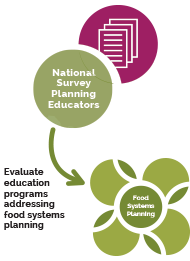
Third Widget test
This is a Third widget sample test.

Half Widget test
This is a sample of the half widget.
Donec porta odio dolor, non sollicitudin leo consequat sit amet. Fusce aliquam blandit ligula, at imperdiet purus dignissim nec. Integer lacinia purus augue, at bibendum nibh vestibulum non. Maecenas in convallis leo, ut facilisis leo. Phasellus nec dapibus neque. Aliquam aliquam ligula augue, ut malesuada purus malesuada eget. Cras nec ullamcorper ligula. Sed sed ornare libero, vel suscipit enim. Duis congue felis eget mauris auctor molestie sed quis odio. In hac habitasse platea dictumst. Duis bibendum iaculis imperdiet. Ut ut erat non tortor blandit volutpat vel non dolor. Nunc tincidunt erat nulla, ut lobortis mauris posuere ac.
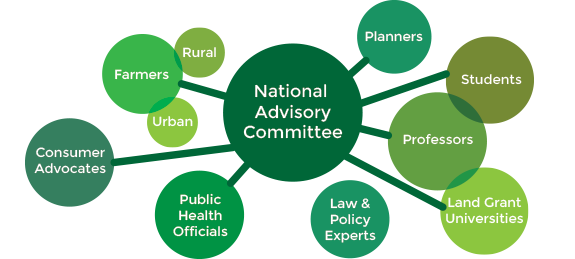
Full Widget Sample
Quisque semper tellus id neque adipiscing, a suscipit sapien aliquam. Quisque et mi dictum, tempus odio ac, condimentum tellus. Donec sed felis vitae risus pulvinar iaculis. Morbi porttitor rhoncus diam hendrerit pulvinar. Sed placerat id lacus id feugiat. Suspendisse pulvinar dapibus ante, blandit facilisis nisl dictum eget. Cras interdum faucibus metus ut tristique.
3 Column Widget Sample

Quisque semper tellus id neque adipiscing, a suscipit sapien aliquam. Quisque et mi dictum, tempus odio ac, condimentum tellus. Donec sed felis vitae risus pulvinar iaculis.

Quisque semper tellus id neque adipiscing, a suscipit sapien aliquam. Quisque et mi dictum, tempus odio ac, condimentum tellus. Donec sed felis vitae risus pulvinar iaculis.
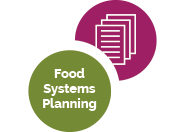
Quisque semper tellus id neque adipiscing, a suscipit sapien aliquam. Quisque et mi dictum, tempus odio ac, condimentum tellus. Donec sed felis vitae risus pulvinar iaculis.
Donec porta odio dolor, non sollicitudin leo consequat sit amet. Fusce aliquam blandit ligula, at imperdiet purus dignissim nec. Integer lacinia purus augue, at bibendum nibh vestibulum non. Maecenas in convallis leo, ut facilisis leo. Phasellus nec dapibus neque. Aliquam aliquam ligula augue, ut malesuada purus malesuada eget. Cras nec ullamcorper ligula. Sed sed ornare libero, vel suscipit enim. Duis congue felis eget mauris auctor molestie sed quis odio. In hac habitasse platea dictumst. Duis bibendum iaculis imperdiet. Ut ut erat non tortor blandit volutpat vel non dolor. Nunc tincidunt erat nulla, ut lobortis mauris posuere ac.
2 Column Widget Sample

Quisque semper tellus id neque adipiscing, a suscipit sapien aliquam. Quisque et mi dictum, tempus odio ac, condimentum tellus. Donec sed felis vitae risus pulvinar iaculis.

Quisque semper tellus id neque adipiscing, a suscipit sapien aliquam. Quisque et mi dictum, tempus odio ac, condimentum tellus. Donec sed felis vitae risus pulvinar iaculis.
Donec porta odio dolor, non sollicitudin leo consequat sit amet. Fusce aliquam blandit ligula, at imperdiet purus dignissim nec. Integer lacinia purus augue, at bibendum nibh vestibulum non. Maecenas in convallis leo, ut facilisis leo. Phasellus nec dapibus neque. Aliquam aliquam ligula augue, ut malesuada purus malesuada eget. Cras nec ullamcorper ligula. Sed sed ornare libero, vel suscipit enim. Duis congue felis eget mauris auctor molestie sed quis odio. In hac habitasse platea dictumst. Duis bibendum iaculis imperdiet. Ut ut erat non tortor blandit volutpat vel non dolor. Nunc tincidunt erat nulla, ut lobortis mauris posuere ac.
One Over Three Widget Sample

Donec porta odio dolor, non sollicitudin leo consequat sit amet. Fusce aliquam blandit ligula, at imperdiet purus dignissim nec. Integer lacinia purus augue, at bibendum nibh vestibulum non. Maecenas in convallis leo, ut facilisis leo. Phasellus nec dapibus neque. Aliquam aliquam ligula augue, ut malesuada purus malesuada eget. Cras nec ullamcorper ligula. Sed sed ornare libero, vel suscipit enim. Duis congue felis eget mauris auctor molestie sed quis odio. In hac habitasse platea dictumst. Duis bibendum iaculis imperdiet. Ut ut erat non tortor blandit volutpat vel non dolor. Nunc tincidunt erat nulla, ut lobortis mauris posuere ac.

Donec porta odio dolor, non sollicitudin leo consequat sit amet. Fusce aliquam blandit ligula, at imperdiet purus dignissim nec. Integer lacinia purus augue, at bibendum nibh vestibulum non. Maecenas in convallis leo, ut facilisis leo.

Donec porta odio dolor, non sollicitudin leo consequat sit amet. Fusce aliquam blandit ligula, at imperdiet purus dignissim nec. Integer lacinia purus augue, at bibendum nibh vestibulum non. Maecenas in convallis leo, ut facilisis leo.

Donec porta odio dolor, non sollicitudin leo consequat sit amet. Fusce aliquam blandit ligula, at imperdiet purus dignissim nec. Integer lacinia purus augue, at bibendum nibh vestibulum non. Maecenas in convallis leo, ut facilisis leo.
Donec porta odio dolor, non sollicitudin leo consequat sit amet. Fusce aliquam blandit ligula, at imperdiet purus dignissim nec. Integer lacinia purus augue, at bibendum nibh vestibulum non. Maecenas in convallis leo, ut facilisis leo. Phasellus nec dapibus neque. Aliquam aliquam ligula augue, ut malesuada purus malesuada eget. Cras nec ullamcorper ligula. Sed sed ornare libero, vel suscipit enim. Duis congue felis eget mauris auctor molestie sed quis odio. In hac habitasse platea dictumst. Duis bibendum iaculis imperdiet. Ut ut erat non tortor blandit volutpat vel non dolor. Nunc tincidunt erat nulla, ut lobortis mauris posuere ac.
Two over Three Widget Sample
Donec porta odio dolor, non sollicitudin leo consequat sit amet. Fusce aliquam blandit ligula, at imperdiet purus dignissim nec.
Donec porta odio dolor, non sollicitudin leo consequat sit amet. Fusce aliquam blandit ligula, at imperdiet purus dignissim nec.
Donec porta odio dolor, non sollicitudin leo consequat sit amet. Fusce aliquam blandit ligula, at imperdiet purus dignissim nec.
Donec porta odio dolor, non sollicitudin leo consequat sit amet. Fusce aliquam blandit ligula, at imperdiet purus dignissim nec.
Donec porta odio dolor, non sollicitudin leo consequat sit amet. Fusce aliquam blandit ligula, at imperdiet purus dignissim nec.
Donec porta odio dolor, non sollicitudin leo consequat sit amet. Fusce aliquam blandit ligula, at imperdiet purus dignissim nec. Integer lacinia purus augue, at bibendum nibh vestibulum non. Maecenas in convallis leo, ut facilisis leo. Phasellus nec dapibus neque. Aliquam aliquam ligula augue, ut malesuada purus malesuada eget. Cras nec ullamcorper ligula. Sed sed ornare libero, vel suscipit enim. Duis congue felis eget mauris auctor molestie sed quis odio. In hac habitasse platea dictumst. Duis bibendum iaculis imperdiet. Ut ut erat non tortor blandit volutpat vel non dolor. Nunc tincidunt erat nulla, ut lobortis mauris posuere ac.
Leadership
Four investigators, representing academic and professional realms, launched and guided the research, practice (extension and planning practice), and education activities of the project from 2012-2017. Currently, GFC is led and supported by faculty, students, and staff at the University at Buffalo Food Systems Planning and Healthy Communities Lab.
Samina Raja, PhD
Principal Investigator, Growing Food Connections
Professor, School of Architecture and Planning, University at Buffalo
Principal Investigator, Food Systems Planning and Healthy Communities Lab
Dr. Samina Raja’s research, teaching and public service focus on the role of planning in building sustainable and equitable food systems and healthy communities. She is a Professor of Urban and Regional Planning, and the Principal Investigator at the Food Systems Planning and Healthy Communities Lab at the University at Buffalo, The State University of New York. She is the lead author of The Planners Guide to Community and Regional Food Planning: Transforming Food Environments, Building Healthy Communities, one of the earliest guidance reports on food systems planning published by the national American Planning Association. Her research program is funded by local and national sponsors, including the Housing and Urban Development Agency, the National Institute of Food and Agriculture, Robert Wood Johnson and others.
Jill Clark, PhD
Co-Principal Investigator, Growing Food Connections, 2012-2017
Professor, John Glenn School of Public Affairs, Ohio State University
Professor Clark has a Ph.D. in geography from The Ohio State University and a master’s degree from the Nelson Institute for Environmental Studies at the University of Wisconsin. Professor Clark’s research centers on policy, planning and economic development for food and agricultural systems, along with sustainable food markets and infrastructure. Currently, Professor Clark provides statewide leadership for the newly-forming Ohio Network of Food Policy Councils, and national leadership as a member of the eXtension Food Systems Community of Practice team, a partnership of over two dozen universities. Before joining the faculty, Clark directed the Center for Farmland Policy Innovation at Ohio State from its opening in 2006 until her departure in 2012. Before coming to Ohio State University, she directed the Ohio office of American Farmland Trust, a national non-profit.
Julia Freedgood, MA
Co-Principal Investigator, Growing Food Connections, 2012-2017
Assistant Vice President of Programs, American Farmland Trust
Julia Freedgood is AFT’s Assistant Vice President of Programs and oversees federal, state and local program and policy efforts to support farmland protection and agricultural viability. This includes oversight of field operations in several AFT regions, the Farmland Information Center, Planning for Agriculture programming, and research, technical assistance and education to support local and regional food systems, farmland succession, access to land, and family farmers.
The editor and lead author of Saving American Farmland: What Works, Freedgood has written and produced dozens of reports and publications. A recognized national leader in providing services to communities, Freedgood has spent much of her distinguished career ensuring a voice for agriculture in the community planning process. She developed a methodology to assess the contribution of farmland to local budgets called Cost of Community Services Studies, which has now been conducted in more than 150 communities across the country.
With a background in policy analysis and development, Freedgood works closely with agricultural constituencies, from farmers and ranchers to USDA field personnel, with municipal, county and state officials, and with planners, academics and land trusts, to ensure that agricultural land is available and affordable for farming and ranching, natural resources are managed with sound conservation practices, farmers and ranchers are economically viable, and communities support a secure and resilient food supply.
Before joining AFT, Freedgood was executive director of the Federation of Massachusetts Farmers Markets, researcher on a 3-year project called Sustaining Agriculture Near Cities at Tufts University School of Nutrition, and director of sheep industry redevelopment projects at the New England Farm Center. She holds a B.A. from Hampshire College and an M.A. from the School of Urban and Environmental Policy and Planning at Tufts.
Kimberley Hodgson, MURP, MS, AICP, RD
Co-Principal Investigator, Growing Food Connections, 2012-2017
Principal, Cultivating Healthy Places
Kimberley Hodgson, MURP, MS, AICP, RD is the founder and principal of Cultivating Healthy Places, an international consulting business specializing in community health, social equity and resilient food systems planning. As a certified planner and health professional, her work focuses on conducting policy-relevant research and providing technical assistance to the public and private sectors related to the design and development of healthy, sustainable places. Ms. Hodgson is a member of the Vancouver Food Policy Council (VFPC), and a steering committee member of the American Planning Association’s Food Interest Group. She holds an undergraduate degree from New York University in pre-medicine, a Master of Science in food policy and applied nutrition from Tufts University, and a Master of Urban and Regional Planning with a specialization in community health and sustainability from Virginia Tech.
About
About
The overarching goal of this partnership is to enhance community food security while ensuring sustainable and economically viable agriculture and food production. This requires building the capacity of local governments to remove public policy barriers and deploy innovative public policy tools.
Background and Objectives
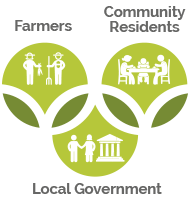

About Capacities
Building the capacity of local governments to improve community food systems to benefit small and mid-sized farmers and underserved community residents.
Food is integral to human sustenance. Yet many Americans are food insecure, struggling to gain access to healthful, affordable and culturally preferred foods. Many farmers and ranchers are struggling to keep their operations viable. This project aims to transform these challenges into opportunities for food producers and communities. We identify innovations in local and regional public policy that strengthen community food systems in order to better support underserved residents and farmers, especially farmers operating small and mid-sized farms. The project builds the capacity of local governments and their partners to create, implement and sustain food system plans and policies that simultaneously promote access to healthy, affordable and culturally acceptable food and foster a viable agricultural sector in their communities.
Research, Education and Planning and Policy in Communities
Growing Food Connections team coordinates and integrates Research, Education and Planning & Policy activities to build a stronger community food system from the ground up. We do this in partnership with individuals and organizations across the research, education, and policy landscape. Please email us to find out how you might partner with us at: growingfoodconnections@ap.buffalo.edu.
![]() Growing Food Connections Overview
Growing Food Connections Overview
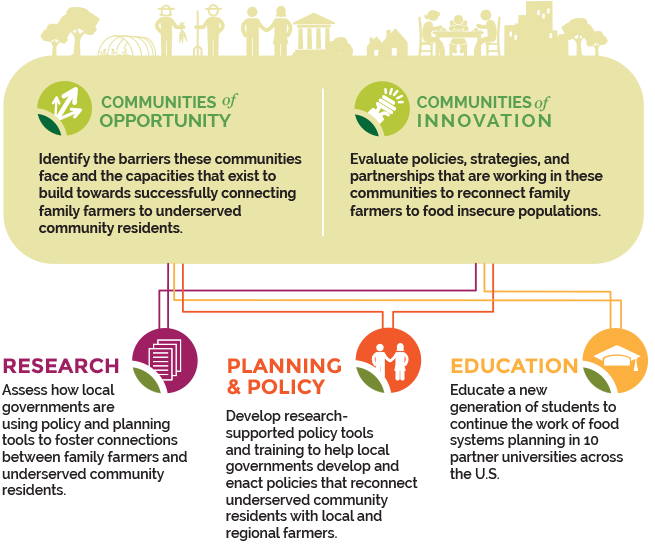
 Local governments can strengthen food systems by developing and implementing food systems plans and related public policies to support regional agriculture, community residents and the markets, delivery systems and infrastructure needed to connect them. Community food systems planning research focuses on improving access to healthy food for all residents, especially those that are underserved by the global food system. Working in all regions of the US, and across urban and rural places, the Growing Food Connections partnership builds the capacity of local governments to deploy evidence-based public policy tools.
Local governments can strengthen food systems by developing and implementing food systems plans and related public policies to support regional agriculture, community residents and the markets, delivery systems and infrastructure needed to connect them. Community food systems planning research focuses on improving access to healthy food for all residents, especially those that are underserved by the global food system. Working in all regions of the US, and across urban and rural places, the Growing Food Connections partnership builds the capacity of local governments to deploy evidence-based public policy tools.
To prepare the next generation of leaders in food systems planning, Growing Food Connections gathers, develops and distributes curricular materials on food systems planning to academic and professional partners. The partnership supports graduate student education and research in food systems at the master’s and doctoral levels.
To build the capacity of Communities of Opportunity to promote food access and economically viable agriculture and food production, Growing Food Connections:
- Provides local government officials and other key stakeholders with knowledge and related resources to better plan for food and agriculture.
- Assists Communities of Opportunity in the creation of partnerships and a policy framework needed to sustain healthy food and agriculture system efforts over time.
- Fosters the development and financing of infrastructure necessary to add value to agricultural production and ensure access to healthy food.
- Connects Communities of Opportunity with Communities of Innovation on how to leverage public and private resources to create healthy, sustainable community-based food systems.
A Diverse Team to Grow Food Connections
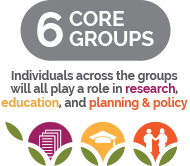 The Partners and Team behind the Growing Food Connections project include 6 Core Groups:
The Partners and Team behind the Growing Food Connections project include 6 Core Groups:
- Investigators
- National Advisory Committee Members
- Food System Experts
- Planning Professionals
- Representatives of Communities of Innovation
- Representatives of Communities of Opportunity
Key Founding Partners
 The American Planning Association‘s Planning and Community Health Research Center (PCH) has undertaken significant work in the area of food systems planning. PCH supported the research, policy & practice, and education activities of Growing Food Connections, to strengthen local and regional food systems planning in the United States.
The American Planning Association‘s Planning and Community Health Research Center (PCH) has undertaken significant work in the area of food systems planning. PCH supported the research, policy & practice, and education activities of Growing Food Connections, to strengthen local and regional food systems planning in the United States.
 David Rouse, AICP
David Rouse, AICP
Former, Managing Director, Research and Advisory Services
During David’s involvement with GFC, he was APA’s Managing Director of Research and Advisory Services in Washington, DC. Trained as both a planner and a landscape architect, David has considerable private and public sector experience in community planning and design. Prior to joining APA, David was a principal at Wallace Roberts & Todd (WRT), a national practice based in Philadelphia. In this capacity, he led WRT’s work on the award-winning Lancaster County, PA Growth Management Plan and Cultivating Community Comprehensive Plan for Union County, PA, as well as other projects addressing food systems and the agricultural economy.
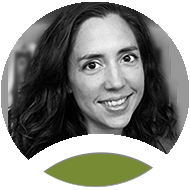 Anna Ricklin
Anna Ricklin
Former Manager, Planning and Community Health Research Center
Anna first became aware of the importance of the built environment to healthy living when she worked to promote public transit, walking and biking in Portland, Oregon. When she moved to Baltimore, MD for graduate school, Anna discovered that transportation choices and access to services were critical to a high quality of life. She later worked on transit planning and bike projects with the Baltimore City Department of Transportation, and completed a health impact assessment of a future light rail line. In 2011, Anna joined the American Planning Association as Manager of the Planning and Community Health Research Center with the aim to better integrate health into all aspects of planning practice. She now works with APA members and partners to research and disseminate best practices that benefit public health, including solutions to the obesity crisis, healthcare access and traditional environmental health concerns. Anna has a Master’s of Health Science from the Johns Hopkins Bloomberg School of Public Health and a BA in Anthropology from American University.
Dedication to Professor Jerome (Jerry) Kaufman
Growing Food Connections (GFC) is dedicated to the intellectual legacy of Professor Jerome L. Kaufman, FAICP, who laid the foundation of food systems planning research, pedagogy and practice within the discipline of urban and regional planning.
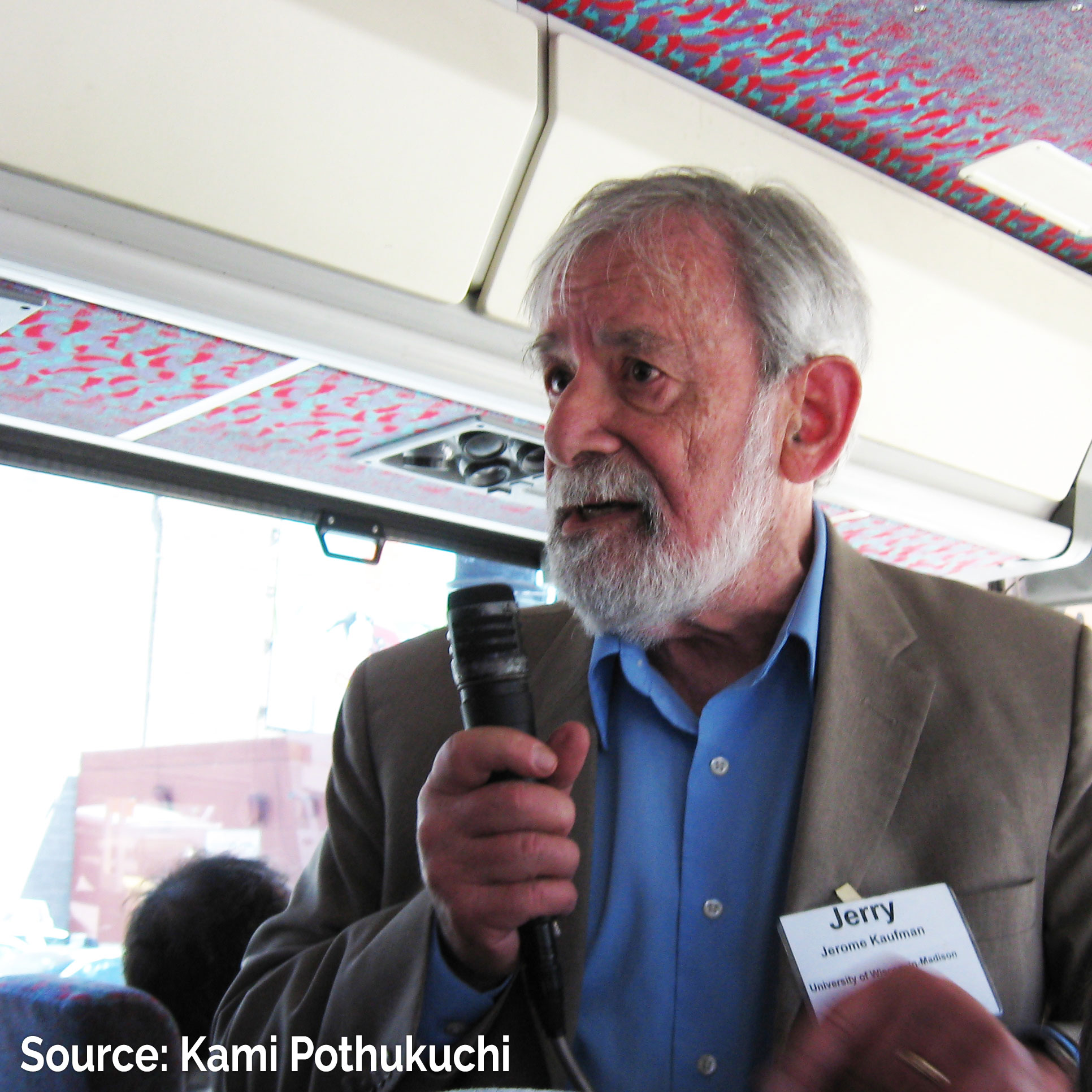
Professor Jerome Kaufman
A visionary, Professor Jerome Kaufman (1933-2013) displayed a rare knack for raising questions about issues ahead of their time. He has left a lasting legacy in the area of food systems planning.
Kaufman made considerable and lasting contributions to the discipline and practice of urban planning. A visionary, Kaufman displayed a rare knack for raising questions about issues ahead of their time. His interests spanned planning ethics, urban education, strategic planning, central city planning, alternative dispute resolution, and his lasting legacy, the area of food systems planning.
Until the late 1990s, the food system, or the network of activities, stakeholders, resources, and institutions that deliver food from field to table, was largely absent from planning discussion. In 1996, Kaufman founded the Madison Food System Project. An early activity of the Project was a capstone seminar class he co-taught in Spring 1997 with Dr. Kami Pothukuchi, on urban food systems in the Department of Urban and Regional Planning at University of Wisconsin. The class produced one of the earliest reports on food systems planning, “Fertile Ground,” which informed subsequent efforts led by Kaufman and colleagues. With his collaborators, Kaufman mapped multiple ways in which municipal planning affects and is impacted by the food system.
During Kaufman’s retirement from his faculty position (2001-2013), considerable shifts occurred in the planning discipline. Because of his continued innovation and leadership during retirement, the American Planning Association (APA) issued the Policy Guide on Community and Regional Food Planning (Kaufman, J., K. Pothukuchi, and D. Glosser. 2007) and a growing number of local governments adopted plans to guide their communities’ food systems to a healthier future.
As evident through the GFC initiative, research, education, and policy pertinent to food systems have advanced considerably. Numerous planning programs in the US offer courses on food systems planning; the American Planning Association now has a Food Division; and, a growing number of scholars focus on food systems. Some of these shifts are documented in Planning for Equitable Urban Agriculture, a book dedicated to Kaufman’s legacy and written by more than 50 authors influenced by Kaufman.
Research
Inaugural National Advisory Committee
A diverse team of advisors from across the United States informed the design and direction of Growing Food Connections from 2012-2016.

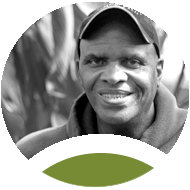 Will Allen
Will Allen
Founder, Growing Power
Will Allen is an urban farmer who is transforming the cultivation, production and delivery of healthy foods to underserved urban populations. As the son of a sharecropper, former professional basketball player, ex-corporate sales leader, and longtime farmer, he is recognized as a national leader in urban agriculture and food policy. After a brief career in professional basketball and several in corporate marketing at Procter & Gamble, Allen returned to his roots as a farmer, using his retirement package to purchase a plot of inner city land with greenhouses, where he established an urban farm and non-profit organization, Growing Power. In 2008, Allen was named a John D. and Katherine T. MacArthur Foundation Fellow, a “genius grant”, only the second farmer ever to be so honored. In February 2010, he was invited to the White House to join First Lady Michelle Obama in launching “Let’s Move!”—her signature leadership program to reverse the epidemic of childhood obesity in America. In May 2010, Time Magazine named Allen one of Time 100 World’s Most Influential People. In 2011, Allen was named one of the World’s Most Powerful Foodies by Michael Pollan and Forbes Magazine in its World Power Issue and he received the NEA Security Benefit Corporation Award for Outstanding Service to Public Education in 2012 for his work with children, teachers and schools. In May 2012, Will Allen became a published autobiographer of the book, The Good Food Revolution: Growing Healthy Food, People, and Communities (Penguin/Gotham Books) and subsequently was nominated for a 2012 NAACP Image Award Nomination.
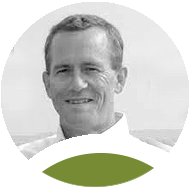 Timothy Griffin, PhD
Timothy Griffin, PhD
Professor, Friedman School of Nutrition Science and Policy, Tufts University
Timothy Griffin, PhD, is a Professor at the Friedman School of Nutrition Science and Policy, Tufts University. At Friedman, he directs the interdisciplinary graduate program, Agriculture, Food and Environment, and teaches classes on US agriculture and agricultural science and policy. His current research focuses on barriers and incentives for regional food systems, conservation practices in agricultural systems, and climate impacts on food production. Before joining the Friedman School in 2008, Dr. Griffin was Research Agronomist with the USDA-Agriculture Research Service in Orono, Maine from 2000 to 2008. He conducted research on many aspects of agricultural production in the Northeast US, including nutrient cycling and grain production on organic dairy farms, crop management and long-term sustainability of high-value production systems. He also initiated research in greenhouse gas emissions, soil carbon and nitrogen cycling, and soil conservation in these systems. From 1992 to 2000, Dr. Griffin was Extension Sustainable Agriculture Specialist with the University of Maine, the first such position in the United States. He graduated from Michigan State University (PhD) and the University of Nebraska (BS and MS).
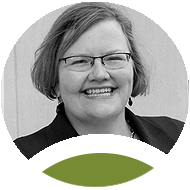 Mary Hendrickson, PhD
Mary Hendrickson, PhD
Professor, Department of Rural Sociology at the University of Missouri
Mary Hendrickson, PhD, is an Associate Professor in the Department of Rural Sociology at the University of Missouri. Her scholarship has strengthened local food systems in the state of Missouri through the Food Circles Networking Project and the Community Food Systems extension programs of the University of Missouri. She has focused on understanding the changes taking place in the global food system and helps farmers, eaters and communities create profitable alternatives. She has worked extensively with community groups to increase the amount of fresh, flavorful and nutritious food available by providing technical assistance on marketing, business planning, feasibility studies, food safety and consumer preferences to farmers and community groups. She was intimately involved in the creation of the Greater Kansas City Food Policy Coalition and serves as a technical advisor for the Missouri Convergence Partnership, a group of funders devoted to changing policies and environments to encourage Healthy Eating and Active Living. Dr. Hendrickson teaches courses on sustainable food and farming systems at the University of Missouri. Dr. Hendrickson participated in the International Assessment of Agriculture Science and Technology for Development as a coordinating lead author on the North America/Europe Sub-Global Report. She has served as President of the Agriculture, Food and Human Values Society and of the Community Food Security Coalition. From 2003 to 2005, she was a Food and Society Policy Fellow, a program funded by the Kellogg Foundation. Dr. Hendrickson is the recipient of the 2012 Meritorious Service Award, presented by the National Farmers Union for her service to agriculture. She holds a B.S. in agribusiness from the University of Nebraska and an MS and PhD in rural sociology from the University of Missouri. She occasionally helps her brother on the family farm near Shickley, Nebraska.
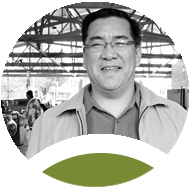 Young Kim
Young Kim
Former Executive Director, Milwaukee’s Fondy Food Center
Young Kim served as the Executive Director of Milwaukee’s Fondy Food Center. The Fondy Food Center’s mission is to connect North Side Milwaukee to local, healthy food—from the farm to the table. The organization fulfills its mission by operating the city’s largest farmers market through food stamp and produce consumption incentive programs, cooking education, and, most recently, through an 80-acre vegetable farm in nearby Port Washington. The Fondy Food Center is also a founding member of the Lindsay Heights Neighborhood Health Alliance—an innovative consortium of nonprofits and residents working to improve the health and well-being of North Side Milwaukee citizens. Kim is the recipient of the 2006 Wisconsin Hunger Hero Award and the 2012 Doug Janssen Emerging Milwaukee Leader Award. He is the food systems columnist for Milwaukee’s leading urbanist news website, urbanmilwaukee.com.
Before moving to Milwaukee, Kim spent eight years in Seattle working with that city’s homeless population. His corporate job experiences include stints as a custom bicycle wheel builder and racing bicycle component buyer with factories in the Far East. A second-generation Korean American who was born and raised in the American Deep South, Kim is always on the lookout for culturally significant recipes. When he’s not thinking of food history and food justice, he likes to restore vintage fountain pens.
Young Kim is a graduate of Oberlin College. He lives in Wauwatosa, Wisconsin.
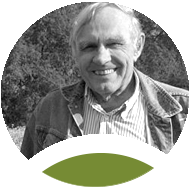 Frederick L. Kirschenmann, PhD
Frederick L. Kirschenmann, PhD
Distinguished Fellow, Leopold Center for Sustainable Agriculture at Iowa State University
President, Stone Barns Center for Food and Agriculture in Pocantico Hills, New York
Frederick L. Kirschenmann, PhD, a longtime national and international leader in sustainable agriculture, shares an appointment as Distinguished Fellow for the Leopold Center for Sustainable Agriculture at Iowa State University and as President of Stone Barns Center for Food and Agriculture in Pocantico Hills, New York. He also continues to manage his family’s 1,800-acre certified organic farm in south central North Dakota.
He is a professor in the ISU Department of Religion and Philosophy and holds a doctorate in philosophy from the University of Chicago. He has held numerous appointments, including the USDA’s National Organic Standards Board and the National Commission on Industrial Farm Animal Production operated by the Johns Hopkins School of Public Health and funded by Pew Charitable Trusts. He served as the Leopold Center’s second director from July 2000 to November 2005, when he was named a Distinguished Fellow.
He joined the board of the Stone Barns Center in 2004 and was elected president in 2007. In January 2008, he assumed a half-time appointment at Stone Barns, dividing his time between Iowa and New York, to explore ways that rural and urban communities can work together to develop a more resilient, sustainable agriculture and food system.
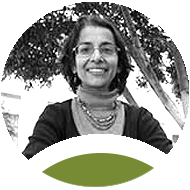 Kami Pothukuchi, PhD
Kami Pothukuchi, PhD
Distinguished Service Professor of Urban Planning, Wayne State University
Kami Pothukuchi, PhD, is Distinguished Service Professor of urban planning at Wayne State University. She is the founding director of SEED Wayne, a campus-community collaborative dedicated to building sustainable food systems at WSU and in Detroit neighborhoods. Her research examines how interventions in community food systems can help achieve goals in public health, economic development, social justice and ecological sustainability.
Dr. Pothukuchi’s research and professional activities have helped create the sub-field of food planning within the broader field of community and regional planning. She has published on such food system topics as retail grocery in underserved areas, urban agriculture, community food assessments, local food policy and planning and university roles in food sustainable food systems. The “Community and Regional Food Planning Policy Guide,” co-authored with Jerry Kaufman and Deanna Glosser, was formally adopted by the American Planning Association in 2007.
Dr. Pothukuchi has guided several local and national advisory groups that work to realize important social goals through food. For example, she is a member of the Detroit Food Policy Council and the city of Detroit’s Urban Agriculture Work Group, and a co-convenor of the Food Planning Interest Group of the American Planning Association. She is one of three recipients of the 2013 Dr. Arthur L. Johnson Community Leadership Award.
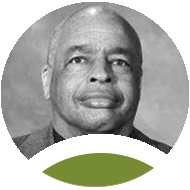 Louie Rivers, Jr.
Louie Rivers, Jr.
Project Manager, Small Farmer Outreach Training and Technical Assistance Program at Kentucky State University, College of Agriculture, Food Science, and Sustainable Systems (CAFSSS)
He earned his BS degree in animal husbandry from South Carolina State College in 1970 and an MS in dairy science from the University of Florida in 1972. He graduated from the US Army Command and General Staff College.
After completing his Master’s Degree, he served in the United States Army for more than 20 years. He retired in 1992 at the rank of Lieutenant Colonel, having served his country in many demanding assignments stateside and overseas. His final assignment was as the Professor of Military Science at North A & T State University. He served as a County Extension Agent in Georgia and South Carolina before coming to Kentucky to his current position.
In his role as Project Manager, Rivers develops and implements the Small Farmer Outreach Training and Technical Assistance Program for eligible farmers in the Commonwealth. He supervises the staff and develops educational and training material for use by area and county staff working with socially disadvantaged farmers in Kentucky.
He has served as a proposal reviewer for USDA-NIFA grant applications for the last five years. He has given presentations at the county, state and national level. He served on the Governor Commission on Family Farms.
He serves on the National Small Farm Conference Planning Committee; Kentucky Small Farm, Limited-Resource/Minority Farmers Conference Planning Committee; the Epsilon Sigma Phi-Alpha Kappa Chapter board of directors; the Community Farm Alliance board of directors; Kentucky Association of State Extension Specialists board of directors; and the Franklin County Habitat for Humanity board of directors.
Louie Rivers, Jr., and his wife own and operate a tree farm in his native state of South Carolina.
 Eduardo Sanchez, MD, MPH, FAAFP
Eduardo Sanchez, MD, MPH, FAAFP
American Heart Association National Center
Eduardo Sanchez, MD, MPH, FAAFP is Chief Medical Officer for the American Heart Association National Center. From 2008 until March 2013, he served as vice president and chief medical officer for Blue Cross and Blue Shield of Texas (BCBSTX). Prior to that, Dr. Sanchez served as the director of the Institute for Health Policy at the University of Texas – School of Public Health and before that as commissioner of the Texas Department of State Health Services from 2004 to 2006 and the Texas Department of Health from 2001 to 2004. He served as the local public health officer in Austin-Travis County from 1994 to 1998. Dr. Sanchez received his MD from the University of Texas Southwestern Medical School in Dallas, an MPH from the University of Texas Health Science Center at Houston School of Public Health and an MS in biomedical engineering from Duke University. He holds a BS in biomedical engineering and a BA in chemistry from Boston University. Dr. Sanchez is board certified in family medicine.
Community Food Systems Planning
Community food systems planning provides a systematic and comprehensive approach to identifying food system challenges and opportunities within a community and developing public policy tools to address them.
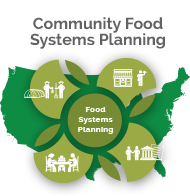
GFCUS
Community food systems planning provides a systematic and comprehensive approach to identifying food system challenges and opportunities within a community.
What is a Community Food System?
A food system is the soil-to-soil system that connects food production, processing, distribution, acquisition, consumption and waste disposal in food and agriculture. This includes all the resources, technologies, stakeholders, relationships, policies and laws that shape and influence how food moves through the system – from farm to plate and back to the farm again. In a well-functioning community food system, the food production, processing, distribution, consumption and post-consumer waste disposal are all integrated to enhance the environmental, economic, social and nutritional health of a particular place and its inhabitants.
Community Food Systems Planning
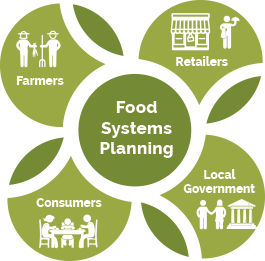
Community Food Systems Planning
At its best, food systems planning is rooted in the collaborative partnership between the food system community, including farmers, retailers, and consumers, and the local and regional governments.
Food systems planning is a set of interconnected, forward-thinking activities that strengthen a community’s food system through the creation and implementation of plans and policies. Individuals and organizations engaged in food system planning identify the opportunities and challenges within communities’ food systems, gather input from stakeholders and deliberate on the actions best suited to respond to challenges, and facilitate and implement actions to strengthen food systems. At its best, food systems planning is rooted in the collaborative partnership between the food system community, including farmers, retailers and consumers, and the local and regional governments.
Through the food systems planning process, local and regional governments develop and implement a variety of public policies to influence and shape how food is produced, processed, distributed, accessed, purchased, consumed or disposed. These policies provide direction and guidance on how to address opportunities and challenges faced by the community’s food system. Examples of public policies that address food systems include:
- Comprehensive or other official plans that support food systems in their goals, objectives and implementation actions.
- Laws and ordinances that regulate different parts of the food system.
- Public education programs.
- Financial investments, through grants and tax incentives, to support different parts of the food system.


